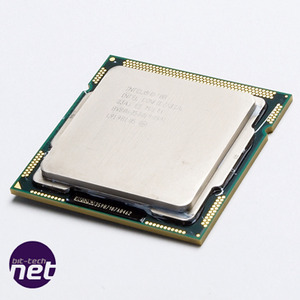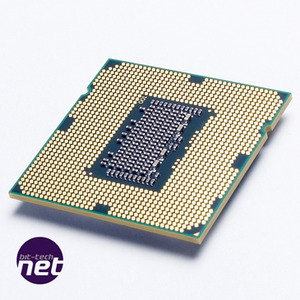
Results Analysis
All three Lynnfield CPUs were significantly faster in our Media Benchmarks than the three Core 2 CPUs and the two Phenom IIs, showing once again the superiority of the Nehalem architecture. For example, the i5-750 (which rarely hit 3.2GHz) achieved an overall score of 1,474 compared to the 1,288 of the 3GHz Q9650 or the mere 1,038 of the 2.4GHz Q6600. Notably, the i5-750 even outperformed the much more expensive i7-920 in some tests.However, the triple-channel memory of the i7-920 gave it the advantage in the memory intensive Gimp image editing test, and in the heavily multi-threaded Cinebench. As so few games address more than two execution cores at once, Turbo Mode (rev 2) gives the Lynnfield CPUs an advantage over other quad-core CPUs when gaming, as they can overclock themselves to match the frequency of fast dual-core CPUs.
As such, the Lynnfield CPUs were faster than the i7-920 at Crysis and X3. The Lynnfield CPUs were also the first quad-core CPUs to match the high-frequency dual-core E8600 for gaming performance. That said, once overclocked, the i7-920 still proved king of the hill thanks to its superlative memory bandwidth.
To round off the excellent set of stock speed results for Lynnfield, we found them to be very energy-efficient too, consuming between 10W and 30W less when under full load than the i7-920.
Conclusion
Intel has created an odd position for its new Lynnfield CPUs by releasing them eight months after the high-performance LGA1366 platform. On the one hand, it's great to see that Intel has finally produced a quad-core CPU that can hold its own against the best dual-core CPUs in games. This means that at long last, you can get the best performance in multi-threaded applications and games from one chip. However, this isn't the same thing as saying that a Lynnfield-core CPU is the perfect upgrade from Core 2.Beyond its confusing naming scheme, the big problem for Lynnfield is the cost of upgrading - you really need to sit down and do some maths before placing your order. To start with, let's look at the price of building a Lynnfield system. As the earlier table showed, you could build a system with a Core i5-750 for just over £40 more than a system with a Core 2 Quad Q9650. As such, the Core i5-750 is clearly a great deal, as it's 14 to 40 per cent faster than the Q9650.


Although there are three new Lynnfield-core processors at launch only once is worth buying. Click to enlarge.
In contrast, the fully-fledged LGA1366 Core i7-920 is cheaper than both of the new Lynnfield Core i7 CPUs. With LGA1156 and dual-channel DDR3 memory comparable in price to LGA1366 and triple-channel kits, we don't see the point in opting for an LGA1156 Core i7 CPU at all. If you're too lazy or scared to overclock, the Core i7-860 is faster thanks to Turbo Boost (rev 2), but the Core i7-920 is far faster when manually overclocked.
However, opting for an LGA1366 system has many advantages over an LGA1156 one. There's a wider choice of motherboards and coolers, while the X58 chipset and triple-channel memory are better for gaming than P55 and dual-channel memory. Folders and multi-monitor enthusiasts will also appreciate the extra graphics slots of provided by X58, while having 6GB of memory for much the same price as 4GB is also welcome. Finally, we know that Intel will continue to release CPUs on LGA1366, as the company told us that prototypes of the six-core Gulftown CPU are currently being tested on LGA1366 motherboards. This forthcoming CPU probably won't be cheap, however. Therefore, neither LGA1156 Core i7 CPU is worth buying - you'd be better off with an LGA1366 and Core-i7-920 system.
Of course, there will be cheaper LGA1156 motherboards on the way, which will help to make the Core i5-750 more attractive - the cheapest we are close to forming an opinion on is MSI's P55-GD65 motherboard, but at around £135, it's still priced higher than we would have hoped. For the Core i5-750 to become a truly great purchase, we believe that there need to be a bunch of respectably-featured boards closer to the £100 mark because, even with the P55-GD65 and cheaper memory, the platform costs aren't much lower than a Core i7-920 based system.
With that in mind, even if you like the look of the Core i5-750, you really should decide whether you can stretch to an i7-920 as things currently stand, just to make sure you're getting a good deal. Either way, our advice is to go out and buy a Core i7-920 before Intel realises its mistake and discontinues it.
Intel Core i5-750
- Performance
- x
- x
- x
- x
- x
- x
- x
- x
- -
- -
- 8/10
- Value
- x
- x
- x
- x
- x
- x
- x
- -
- -
- -
- 7/10
- Overall
- x
- x
- x
- x
- x
- x
- x
- x
- -
- -
- 8/10
Intel Core i7-860
- Performance
- x
- x
- x
- x
- x
- x
- x
- x
- -
- -
- 8/10
- Value
- x
- x
- x
- x
- x
- -
- -
- -
- -
- -
- 5/10
- Overall
- x
- x
- x
- x
- x
- -
- -
- -
- -
- -
- 5/10
Intel Core i7-870
- Performance
- x
- x
- x
- x
- x
- x
- x
- x
- -
- -
- 8/10
- Value
- x
- x
- -
- -
- -
- -
- -
- -
- -
- -
- 2/10
- Overall
- x
- x
- x
- -
- -
- -
- -
- -
- -
- -
- 3/10
Score Guide

MSI MPG Velox 100R Chassis Review
October 14 2021 | 15:04









Want to comment? Please log in.